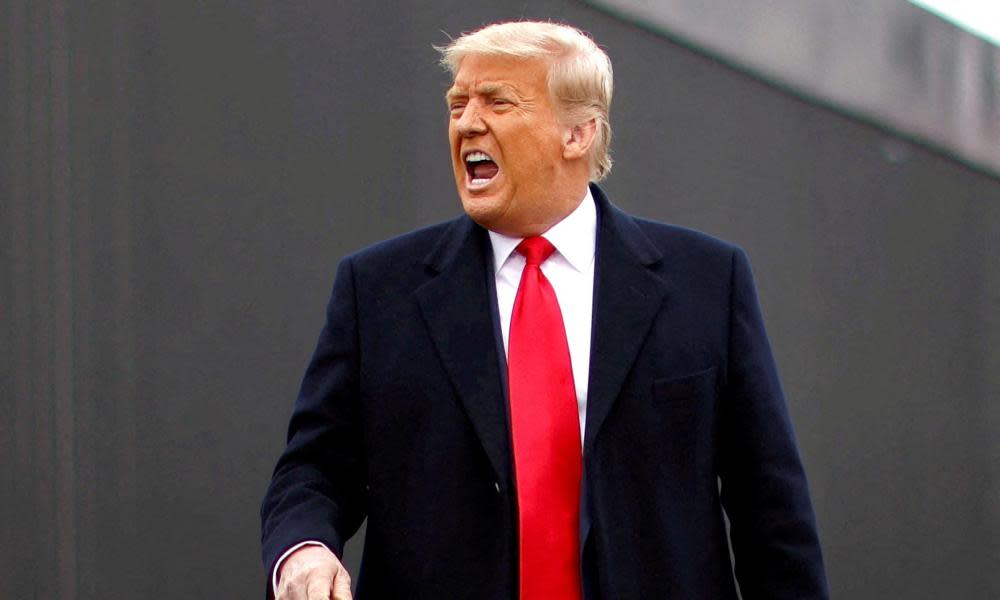Trump’s latest indictment: what do the charges mean and what’s next?

- Oops!Something went wrong.Please try again later.
Donald Trump has been indicted for illegally retaining classified government documents after leaving office in 2021.
What happens next and what do the charges mean for the former president and the 2024 election campaign?
What is Trump accused of doing?
Trump is being charged with 37 criminal counts, including mishandling classified documents and obstruction of justice, according to an indictment unsealed on Friday afternoon.
He had proclaimed his innocence on Thursday evening.
According to the indictment, Trump stored classified documents in “a ballroom, a bathroom and shower, an office space, his bedroom, and a storage room” at his Mar-a-Lago resort in Florida.
It also added that Trump directed Walt Nauta, his valet and aide, to deliberately move boxes of records to “conceal them from Trump’s attorney, the FBI, and the grand jury”. Nauta also faces a count of conspiracy to obstruct justice, said the indictment.
Related: Jack Smith: veteran special counsel at the center of Trump investigations
In January 2022, Trump agreed to return 15 boxes of records to the US National Archives and Records Administration, and officials discovered in them more than 700 pages of records marked as classified.
In August last year, the FBI conducted a search of Trump’s Mar-a-Lago home in Palm Beach, Florida, and seized approximately 13,000 more records, about 100 of which were marked as classified, including some marked top secret.
What charges does Trump face?
The most serious charge is being brought under the Espionage Act, which criminalizes the unauthorized possession of national defense information. It is punishable by up to 10 years in prison.
The first world war-era law predates classification of documents but makes it a crime to willfully retain national defense information that could be useful to foreign adversaries.
According to the indictment, documents possessed by Trump “included information regarding defense and weapons capabilities of both the United States and foreign countries; United States nuclear programs; potential vulnerabilities of the United States and its allies to military attack, and plans for possible retaliation in response to a foreign attack”.
Trump is also charged with several counts of obstruction of justice, which criminalizes any “intent to impede, obstruct, or influence” an investigation and is also charged with making false statements to investigators.
“The purpose of the conspiracy was for Trump to keep classified documents he has taken with him from the White House and to hide and conceal them from a federal grand jury,” the indictment said.
What happens next?
Trump said he had been summoned to appear in court on Tuesday afternoon in Miami. It was not immediately clear what the procedure would look like. When he was charged by the Manhattan district attorney in the New York Stormy Daniels case (a state case rather than federal), Trump surrendered to authorities, where he was booked behind closed doors and appeared in the courtroom, sitting with his lawyers at the defense table.
In the Mar-a-Lago case, Trump is likely to surrender himself to the FBI, which has a field office in Miami some distance from the federal court. Normally, a defendant would be fingerprinted by prosecutors and have a mugshot taken. It is not known yet if Trump will have his picture taken and whether he will be processed in the FBI office or at the courthouse, before appearing before a judge to formally hear the charges against him read for the first time. He is expected to plead not guilty. After that arraignment, he would probably be released pending his next court appearance.
Does an indictment prevent a candidate from campaigning or taking office?
None of the charges expected to be unsealed would bar Trump from office if he became the Republican party nominee and then won the presidency at the 2024 election, even if convicted.
A trial would take place many months from now, and Trump can freely campaign during this time. The US constitution only requires that presidential candidates be natural-born US citizens who are at least 35 years old and have lived in the country for 14 years.
Trump said on Thursday on his Truth Social platform that he is innocent. He would be free to campaign even if he is convicted and sent to prison, and legal experts say there would be no basis to block his swearing-in as president even if he is incarcerated, though this would pose extraordinary logistical and security questions.
What would happen if Trump took office while the Mar-a-Lago case is pending?
It is unlikely that the prosecution would proceed if Trump won the November 2024 election.
The US Department of Justice is part of the executive branch, and presidents are the top federal law enforcement officers in the country. Federal prosecutors generally serve at their pleasure. The justice department has a decades-old policy that a sitting president cannot be prosecuted. The department can deviate from policy in “extraordinary circumstances” with the approval of the US attorney general.
Could Joe Biden pardon Trump?
Yes.
Could Trump, as president, pardon himself?
Maybe. Many scholars have said a self-pardon would be unconstitutional because it violates the basic principle that nobody should be the judge in his or her own case. Others have argued that a self-pardon is constitutional because the pardon power is very broadly worded in the constitution. However, Trump could not pardon himself for a conviction in state court. He is currently under indictment in New York state court for allegedly using falsified records to conceal hush-money payments he paid to Stormy Daniels, and Georgia prosecutors are investigating his efforts to overturn the results of the 2020 election in that state.
Reuters contributed reporting

